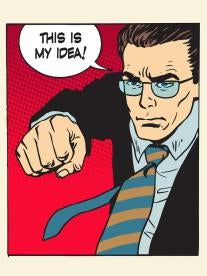"We are certainly flattered by your affection for the brand"
Christy Susman made news for her surprisingly kind words to Patrick Wensink, author of Broken Piano for President, in a cease-and-desist letter after discovering the book's cover was nearly identical to the label found on Jack Daniel's Tennessee Whiskey bottle. The letter portrayed Jack Daniel's recognition of potential brand infringement as flattery resulting from Wensink's "affection for the brand," while also indicating the necessity for enforcement so as not to weaken their trademark, and even offered to contribute monetarily to changing the book's cover.
 Intellectual property concerns are also ever present in the automotive industry, as the increase in technology in cars exposes manufacturers and suppliers to greater intellectual property and patent risks. “Our intellectual property is the lifeblood of our company, and we must protect it all costs,” said Mike Richards, president of global automotive business at Trilogy Inc., parent company of Versata, when commenting on Versata's lawsuit against Ford Motor Company. Versata claimed a 2014 patent Ford received on internally developed software was, in fact, derived from technology Versata had previously licensed to Ford.
Intellectual property concerns are also ever present in the automotive industry, as the increase in technology in cars exposes manufacturers and suppliers to greater intellectual property and patent risks. “Our intellectual property is the lifeblood of our company, and we must protect it all costs,” said Mike Richards, president of global automotive business at Trilogy Inc., parent company of Versata, when commenting on Versata's lawsuit against Ford Motor Company. Versata claimed a 2014 patent Ford received on internally developed software was, in fact, derived from technology Versata had previously licensed to Ford.
What is Intellectual Property?
Intellectual property is commonly described as any creation of the human mind that is protected by law from reproduction or use by an unauthorized person. There are four broad types of intellectual property: trademarks, patents, copyrights, and trade secrets. Each of these forms of IP protects different ideas, creations, and proprietary business assets. [For more information about these distinct types of IP, please see part-one of this series.]
Enforcing Your Rights to Your Intellectual Property
According to the PricewaterhouseCoopers 2013 Patent Litigation Study, the automotive industry has continually ranked in the top 10 for the number of patent cases filed between 1995 and 2012.
Presuming you have properly protected your intellectual property [see part-two of this series], you have every right to enforce it. There are different methods of enforcement, ranging from pre-litigation and through a formal lawsuit. A cease-and-desist letter, typically the first step, asks someone to stop the illegal use of your intellectual property ("cease"), and not to use it again in the future ("desist"). These letters should include the identity and rights of the intellectual property holder, as well as a deadline by which the recipient must stop using the intellectual property before being sued.
As modeled by counsel for Jack Daniel's, the goal of a cease-and-desist letter is to foster cooperation and avoid litigation. Thus, it is in your best interest to be cordial, professional, and calm, similar to the approach taken by Jack Daniel's, as opposed to appearing threatening or angry. However, if the cease-and-desist letter is unsuccessful, the next likely step is to file a lawsuit.
Business Considerations
If a particular infringement poses a significant threat to your business or operations, then you may find yourself pursuing a lawsuit. However, some cases of apparent infringement are either minor or perhaps not even infringement at all, and therefore not worthy of litigation.
While the protection of your intellectual property is a serious matter, it is important to weigh the economic considerations of enforcement, especially because litigation is time consuming and expensive. For example, the average patent lawsuit can cost each side millions in legal fees and expenses alone. In Versata's case, Ford began using Versata's product development software technology in 1998 as part of an $8.45 million-a-year contract, terminating it in 2014 after developing their own. Thus, it is easy to see that Versata's pursuit of its intellectual property enforcement made sense from a business perspective. Trademark, copyright, and trade secret related litigation typically costs far less but is still costly and time consuming. Therefore, you should carefully review the facts and assess the situation including the infringement's likely impact on your business before you decide to engage in litigation.
This article was co-written by Lauren Potocsky.




 i
i


